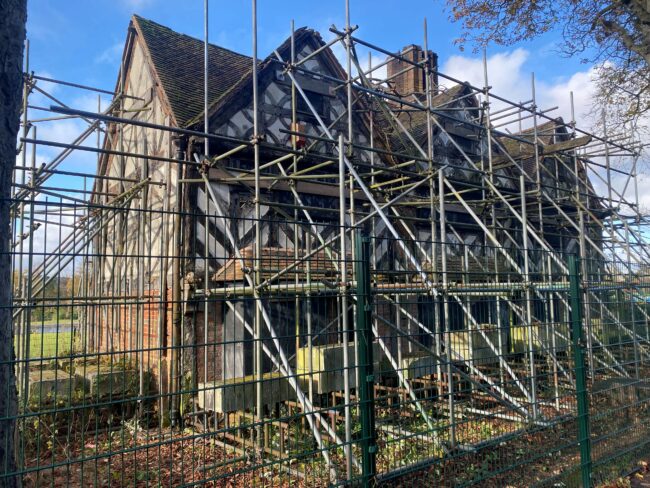Historic England reveals plans for derelict Grade-II Listed pub in Cannon Hill Park

- Historic England has offered a £32,008 project development grant to Birmingham Conservation Trust to begin the process of bringing one of Birmingham’s most neglected, but highly significant assets back into use.
- The Golden Lion Inn situated in Cannon Hill Park has been abandoned for decades, but funding will enable initial scoping works to begin.
- The 16th century timber framed building was originally located in Deritend. It was in use as a public house until 1911, when the building was moved by the Birmingham Archaeological Society to Cannon Hill Park to be used as a cricket pavilion and refreshment room.
- In 1912 the building was targeted by Suffragettes who threw oil on the building and set it alight.
- Add your memories and photographs of Cannon Hill Park and the Golden Lion Inn to the Missing Pieces Project – everything you add is an important piece of the picture.
- Download images: https://photos.app.goo.gl/gFZPBR1APpNs7MUo6 Historic England is today (6th November) announcing the offer of a grant of £32,008 towards a £40,008 project development scheme with the aim of bringing the Grade II Listed Golden Lion Inn building in the Grade II* Listed Cannon Hill Park back into use. Birmingham Conservation Trust is pursuing funding to carry out the project development works to establish the extent of the decay of the building, and the cost of repairs and refurbishment.
These are the first steps in giving the building a new lease of life so that it can be used and enjoyed by the local community. The work will include a measured survey, conservation plan, management and maintenance plan, timber decay survey, dendrochronology, and asbestos, ecological and tree surveys.
Louise Brennan, Regional Director (Midlands) for Historic England said: “It’s wonderful to be part of this collaborative project to bring the Golden Lion Inn back from the brink. We’re really proud that we can start the process of restoration and renewal with this crucial project development grant. These works are a vital first step in securing the future of this storied landmark for the people of Birmingham and bringing it back into use”.
Richard Garside, Chair of Board of Trustees at Birmingham Conservation Trust said: “Birmingham Conservation Trust (BCT} has been rescuing buildings at risk in the city since 1977. The last building completed was the Newman Brothers Coffin Works, opened in 2014 and now an award-winning museum and our home. The Golden Lion, a much-loved and historically significant building presents a wonderful opportunity for BCT to continue the Trust’s commitment to conservation of the city’s built heritage.”
The timber framed former pub was originally located in Deritend. It was a pub until 1911 when the building was moved by the Birmingham Archaeological Society to Cannon Hill Park to be used as a cricket pavilion and refreshment room. In 1912 the building was targeted by Suffragettes who threw oil on the building and set it alight during the night. The fire was discovered by park staff who put the fire out before severe damage was done.
The building has been out of use and closed to the public for more than 20 years and, given its prominent location within the park, has long been an object of fascination and frustration for the local community and park users. Once the project development works have been carried out, and the costs of restoration and refurbishment established, work will begin to establish a plan for the future of the site.
Birmingham Conservation Trust are looking to work with Birmingham City Council and community groups for an initial scoping phase to explore options for the future of the building which will benefit the local community. The project is the first Historic England grant in Birmingham since Birmingham City Council’s Section 114 declaration.
Birmingham City Council have agreed to Birmingham Conservation Trust managing the grant for project development as a significant first step so that future funding for the building can be secured.
Ends.
For further press information please contact: Jay Jackson at Historic England on 07443 368078 or email jay.jackson@historicengland.org.uk


